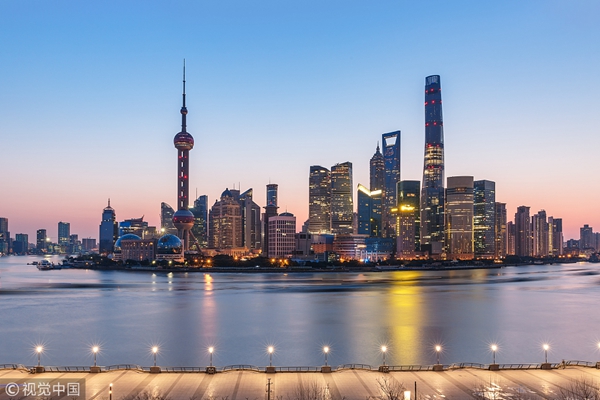Shanghai unveils updated reforms

Dawn breaks
over Lujiazui Financial District in Shanghai. [Photo/VCG]
Measures to cover building permits, commercial affairs, international trade
On the first working day after the Spring Festival holiday, the municipal government of Shanghai announced an updated reform plan to further enhance the city's business activity, showing the local regulators' resolve to improve the business environment in more areas with better results.
Shanghai Party secretary Li Qiang said at a meeting on Monday that the major task for Shanghai this year is to implement the three decisions on the development of Shanghai that President Xi Jinping elaborated in early November, which refer to the expansion of the China (Shanghai) Pilot Free Trade Zone, the launch of a science and technology innovation board at the Shanghai Stock Exchange and piloting a registration system for listed companies, as well as the integrated development of the Yangtze River Delta region. All these are important policies to improve the business environment of the city, he said.
In October, the World Bank released the Doing Business 2019 report that measures regulations that enhance business activity and those constrain it. China ranked 46th among all the 190 surveyed economies, significantly up from the 78th registered a year earlier. Shanghai's contribution was weighed at 55 percent while the rest came from Beijing.
Although much progress was made last year, Li said Shanghai should continue to test the reform plan comprehensively to narrow the gap between the leading economies. To be more specific, Shanghai can learn from the successful experiences regarding New Zealand's service industry, Singapore's science and technology advancement, Denmark's employment policies and South Korea's technology innovation.
Meanwhile, Shanghai should also refer to the progress of other Chinese cities such as Beijing and Shenzhen, he said.
"Shanghai's economic growth cannot simply rely on favorable policies and can by no means come from low-cost competition. In this sense, a better business environment will be the long-term impetus," he said.
As much concern has been expressed over the economic slowdown and uncertainties, Li said that the improved business environment will help to address these problems and stabilize the city's economic growth.
"Industry leaders, talents and capital will be attracted to Shanghai as the business environment betters. In this sense, the city's core competitiveness will be enhanced," he said.
An improved business environment helped Shanghai to attract more foreign investment and even the regional headquarters of multinational companies last year. As the municipal regulators revised the financing policies for foreign-invested research centers in the second half of 2018, a total of 25 multinational companies set up their regional headquarters in the city, up 25 percent from a year earlier.
Data from the municipal statistics bureau showed that the number of foreign direct investment contract projects surged 41.7 percent year-on-year to reach 5,597 in 2018. The total value of these contracts amounted to over $46.9 billion, up 16.8 percent year-on-year.
At an international think tank forum held in Shanghai in December, Marcin Piatkowski, a senior economist of the World Bank, said that Shanghai is on the right path to improve its business environment and the city is sure to promise better performance in the future.
"We should not only eye the measurements of the World Bank. The key is to bring substantial benefits to companies," said Li.
Zhou Bo, executive vice-mayor of Shanghai, said half of the current administrative approval items will be canceled and the time needed for such approval will also be shortened by half.


 China's public holidays for 2025
China's public holidays for 2025  Shanghai FTZ: Go all out to build China's first pilot zone for Silk Road E-commerce cooperation
Shanghai FTZ: Go all out to build China's first pilot zone for Silk Road E-commerce cooperation  Favorable policies boost 'China Travel' trend
Favorable policies boost 'China Travel' trend  play
play 